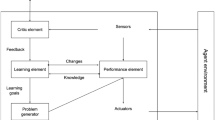Abstract
Traditional approaches to computer ethics regard computers as tools, andfocus, therefore, on the ethics of their use. Alternatively, computer ethicsmight instead be understood as a study of the ethics of computationalagents, exploring, for example, the different characteristics and behaviorsthat might benefit such an agent in accomplishing its goals. In this paper,I identify a list of characteristics of computational agents that facilitatetheir pursuit of their end, and claim that these characteristics can beunderstood as virtues within a framework of virtue ethics. This frameworkincludes four broad categories – agentive, social, environmental, and moral– each of which can be understood as a spectrum of virtues rangingbetween two extreme subcategories. Although the use of a virtue frameworkis metaphorical rather than literal, I argue that by providing a frameworkfor identifying and critiquing assumptions about what a `good' computer is,a study of android arete provides focus and direction to the developmentof future computational agents.
Similar content being viewed by others
References
Aristotle. Nicomachean Ethics. Trans. by Terence Irwin. Indianapolis: Hackett Publishing Co., 1985.
Aristotle. Politics. Trans. by Ernest Barker. London: Oxford University Press, 1946.
Isaac Asimov. The Perfect Machine. Science Journal, 4(10): 115–118, 1968.
Isaac Asimov. I, Robot. NY: Doubleday, 1950; NY: Bantm Books, 1991.
Robert Axelrod. The Evolution of Cooperation. Harper Collins-Basic Books, 1984.
Fah-Chung, Cheong. Internet Agents: Spiders, Wanderers, Brokers, and Bots. Indianapolis: New Riders, 1996.
Peter Danielson. Artificial Morality: Virtuous Robots for Virtual Games. NY: Routledge, 1992.
David Eichmann. Ethical Web Agents. Proceedings of the 2nd International World-Wid Web Conference: Mosaic and the Web, pp. 3–13. Chicago, IL, October 18–20, 1994, 1 August 1999 http:// mingo. info-science.uiowa.edu/eichmann/wwwf94/ ethics/ethics.html.
Oren Etzioni andDaniel Weld. Softbot-Based Interface to the Internet. Communications of the ACM, 37(7): 72–76, 1994.
Stan Franklin andArt Graesser. Is It an Agent, or Just a Program?: A Taxonomy for Autonomous Agents. In J. Müller,M. Wooldridge andN. Jennings, editors, Agent Theories, Architectures, and Languages: Proceedings of the ECAI'96 Workshop (ATAL), pp. 20–35. Budapest, Hungary, August 1996. Lecture Notes in AI, subseries of Lecture Notes in Comp. Sci. 1193. NY: Springer-Verlag, 1997.
Batya Friedman andHelen Nissenbaum. Bias in Computer Systems. ACM Transactions on Information Systems, 14(3): 330–347, 1996. Reprinted in B. Friedman, editor, Human Values and the Design of Computer Technology, pp. 21–40. CSLI Lecture Notes 72. Stanford: CSLI Publications; NY: Cambridge University Press, 1997.
Michael R. Genesereth andSteven P. Ketchpel. Software Agents. Communications of the ACM, 37(7): 48–53, 147, 1994.
James Gips. Towards the Ethical Robot. In K. Ford,C. Glymour andP. Hayes, editors, Android Epistemology, pp. 243–252. Menlo Park, CA: AAAI Press/The MIT Press, 1995.
Garrett Hardin. The Tragedy of the Commons. Science, 162: 1243–1248, 1968.
Umar Khan. Ethics of Autonomous Learning Systems. In K. Ford,C. Glymour andP. Hayes, editors, Android Epistemology, pp. 253–265. Menlo Park, CA: AAAI Press/The MIT Press, 1995.
Arthur Kuflik. Computers in Control: Rational Transfer of Authority or Irresponsible Abdication of Autonomy? Computer Ethics: A Philosophical Enquiry (CEPE' 98), London School of Economics and Political Science, 14 & 15 December 1998.
George Lakoff andMark Johnson. Philosophy in the Flesh: The Embodied Mind and Its Challenge to Western Thought. NY: Basic Books, 1999.
George Lakoff. Women, Fire, and Dangerous Things: What Categories Reveal About the Mind. Chicago: University of Chicago Press, 1987.
Brenda Laurel. Interface Agents: Metaphors with Character. In B. Laurel, editor, The Art of Human-Computer Interface Design, pp. 355–365. Reading, MA: Addison-Wesley, 1990. Reprinted in B. Friedman, editor, Human Values and the Design of Computer Technology, pp. 207–219. CSLI Lecture Notes 72. Stanford: CSLI Publications; NY: Cambridge University Press, 1997.
Douglas Lenat. Computer Software for Intelligent Systems. Scientific American, 251: 204–213, 1984.
Alasdair MacIntyre. After Virtue: A Study in Moral Theory, 2nd edn. Notre Dame, Indiana: University of Notre Dame Press, 1984.
James Moor. Are There Decisions Computers Should Never Make? Nature and System, 1: 217–229, 1979. Reprinted in D. Johnson and J. Snapper, editors, Ethical Issues in the Use of Computers, pp. 120–130. Belmont, CA: Wadsworth Publishing, 1985.
James Moor. What is Computer Ethics? Metaphilosophy, (16): 266–275, 1985.
Henry Petroski. The Evolution of Useful Things. NY: Borzoi-Knopf, 1992.
Frederik Pohl. Midas World. NY: TOR-Tom Doherty, 1984.
B. Reeves andC.I. Nass. The Media Equation: How People Treat Computers, Television, and NewMedia like Real People and Places. Stanford: CSLI Publications; NY: Cambridge University Press, 1996.
Tom Regan. The Case for Animal Rights. Berkeley, CA: University of California Press, 1983.
Tim Smithers. Autonomy in Robots and Other Agents. Brain and Cognition, 34(1): 88–106, 1997.
Gary E. Varner. Biological Functions and Biological Interests. Southern Journal of Philosophy, 28(2): 251–270, 1990.
Laszlo Versenyi. Can Robots Be Moral? Ethics, 84: 248–259, 1974.
James D. Wallace. Virtues and Vices. Ithaca: Cornell University Press, 1978.
Author information
Authors and Affiliations
Rights and permissions
About this article
Cite this article
Coleman, K.G. Android arete: Toward a virtue ethic for computational agents. Ethics and Information Technology 3, 247–265 (2001). https://doi.org/10.1023/A:1013805017161
Issue Date:
DOI: https://doi.org/10.1023/A:1013805017161




